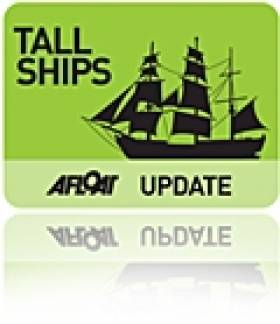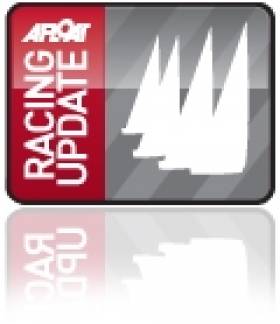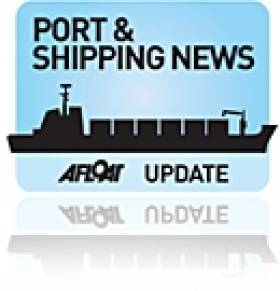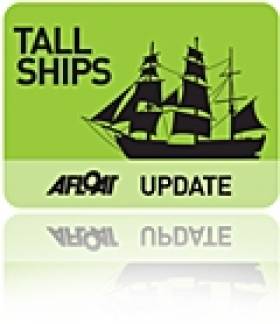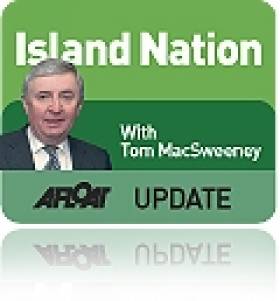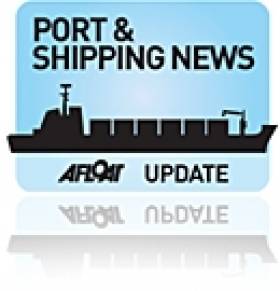Displaying items by tag: ship
Yacht Towed to Harbour after Collision with Tall Ship
The lifeboat launched at 2.38am and was on scene at 3.32am. Reports had been received from Dublin Coast Guard that the yacht was in urgent need of assistance after being damaged on collision with another vessel and was taking on water.
Arriving on scene the volunteer lifeboat crew saw debris in the water and noticed a considerable amount of damage to the yacht on the port side. They immediately assessed the state of the crew on both vessels, fifteen were onboard the Tall Ship and a single crewmember onboard the yacht.
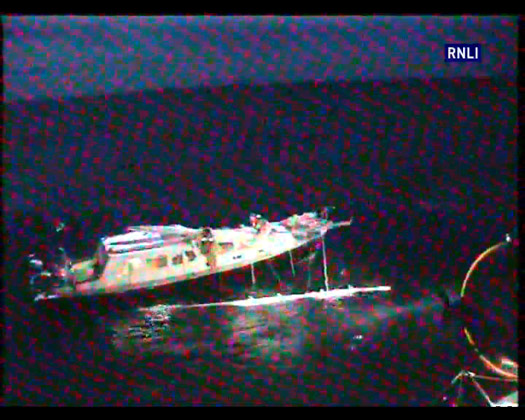
The casualty vessel - Photo: RNLI
On establishing there were no injuries three lifeboat crew boarded the yacht and cleared some of the debris from the water. Due to the damage the lifeboat crew took the yacht under tow back to Rosslare Harbour and the Tall ship made its way on to Waterford.
The Irish Coast Guard Helicopter from Waterford arrived on scene and provided a strong search light overhead for the crews to work in. Conditions were good with a slight swell.
Commenting on the callout, Rosslare Deputy Launching Authority Dave Maloney said, " While there was damage to one of the vessels thankfully there was no serious injury to any person. The priority for the lifeboat crews was to ensure that there was no danger to anyone and that the vessel was taken back to shore as quickly as possible due to the threat of sinking.”
Mid-Week Wrap up: Fireballs, Lasers, Three Peaks, Calves Week, VOR and Life Saving Honours
An Irish debutant leads the fleet after four days of competition in the Three Peaks Yacht Race. Last night Glen Ward's crew were climbing Ben Nevis.
Half the country is heading for the Tall Ships.
400 are now expected for next week's Volvo Dun Laoghaire Regatta.
There's only a month to Calves week in West Cork. The race programme (plus a sponsor) has been unveiled.
One year to go to the finish of the Volvo Ocean race. Galway gets serious.
Who should be June's Sailor of the Month? Water Rat asks are two medals a realistic expectation from London?
And finally, a German Honour on an Irish Lifesaver. Well done Frank Nolan.
All these stories – and more – on our home page this morning!
Minister Coveney is meeting the Harbour Master and will be briefed by the various agencies who are involved in the operation, including the Irish Coast Guard, Galway County Council and the ship's representatives and will be given a full assessment of the current situation and the contingency arrangements being put in place by the agencies involved for the next few days.
The Minister said "I am anxious to see the situation for myself and to express my support to all involved in this multi-agency operation. While this is obviously a very serious and evolving situation, I have full confidence in the Harbour Master and his staff, the Coast Guard and the other agencies involved to do a fully professional job to address the current situation. The purpose of my visit is to reassure all those concerned that this incident is getting the priority it deserves. I am especially concerned to ensure that all appropriate measures are taken to protect the harbour and the local environment and to avoid any pollution during the very challenging efforts to refloat the vessel. "
The current situation and the weather forecast are being carefully monitored by the Coast Guard. Initial investigations, including evidence from divers, indicate no apparent damage to the vessel and no pollution has been reported. Meanwhile, the vessel's owners are in the process of organising tugs to help move it from its current position.
Tall Ship Interests Plan Replacement for Asgard II
Ireland could yet have a Tall ship to replace the Asgard II and the Lord Rank, if a new sailing group formed to press for a replacement is successful. The news is in this morning's Irish Times newspaper. Groups representating different interests from maritime to tourism to economic are getting together for a special conference on March 26th in Dublin Port. The full Irish Times story is HERE. Next week in Afloat magazine's March/April issue an article called 'Tall Order for Ireland' gives all the details on the conference. It includes a 'call for contributions' from key stakeholders who would support a Tall Ship for Ireland. More details HERE. And in a separate article WM Nixon looks at the realities of national sail training in the 21st Century. This new move on a replacement seems to have entirely appropriate timing; Asgard II was commissioned in Arklow 30 years ago this week, on March 7, 1981.
Looking for further reading on Tall Ships in Ireland? Click the links below:
Click this link to read all our Tall Ships Stories on one handy page
Previewing Ireland's Tall Ships 2011 Season
Can Ireland Get a New Tall Ship?
Now There is None
What a magnificent sight it was as the three Tall Ships, each flying the Tricolour, headed the fleet of the gracious ships of sail from all over the world.
How different it will be in July when the world's Tall Ships again parade down the Suir. There will be no Irish national sailing ship to lead the parade. A number of private Irish entries are expected at Waterford from June 30–July 3 amongst the 70 vessels from around the world when the city has the honour starting the race. In 2005 about half-a-million people visited the city while the Tall Ships were there.
The lack of a national tall ship is another example of governmental maritime neglect, directly due to the decision of former Defence Minister Willie O'Dea, T.D. After the sinking of ASGARD he publicly committed the Government to its replacement, but after receiving insurance compensation money for its loss, he put the money into coffers of the Department of Finance and closed down the national sail training programme. There was a big difference between what he promised and what he did, a disregard for the maritime sphere which it is hard to forgive. I also recall how former Taoiseach Bertie Ahern did not visit Waterford during the 2005 race, when it was the biggest tourist event in the country. When I broadcast my report expressing astonishment at this snub government sources and Fianna Fail didn't like it. Truth in the news can be painful!
The organisers made contacts about the DUNBRODY, which continues to earn income at the New Ross quayside where it is moored as a tourist attraction and with the JEANIE JOHNSTON, moored at the Dublin Docklands.
However, neither will be taking part, the organisers have confirmed, tough they said that it was expected that about 100 young Irish trainees would sail aboard tall ships in the race, half of them with funding support from local authority, business and other sources. A group of Irish sailors have also indicated they are making arrangements to charter a UK-registered vessel the JOHANNA LUCRETIA for the event.
Once again the Irish Government has sunk to the bottom where maritime matters are concerned.
It was announced this week in Waterford that Fáilte Ireland has made a significant financial and marketing commitment to this year's event, though the financial figure was not disclosed .A free festival programme will feature street acts; comedy; international and home-grown artists, nightly fireworks, an artisan food village and an atmosphere which the organisers say "will thrill people of all ages and nationalities."
• This article is reprinted by permission of the EVENING ECHO newspaper, Cork, where Tom MacSweeney writes maritime columns twice weekly. Evening Echo website: www.eecho.ie
Demand for Ferry Travel Trebles During Aviation Crisis
73% of the traffic moved through the principal gateways along the central corridor with record numbers of passenger moving through Dublin Port. Elsewhere, similar increased demand was catered for by operators at Rosslare (23% share of traffic), while the new service from Cork also provided additional capacity and distribution to the south of the island.
Commenting on the numbers IMDO Director Glenn Murphy said “The measured and co-ordinated response of all ferry operators, port companies and other transport providers to this surge in demand has been exceptional. There was clearly excellent co-operation between the various groups in their response to this national situation, which was undertaken in an efficient and professional manner at a time when it was most needed.”
Ports and shipping lines provided added additional shuttle bus services to facilitate the surge in the numbers of foot passengers seeking to travel while ferry companies also endeavoured to ensure that all passengers were accommodated during the disruption, with sailings delayed to allow additional time to board the extra passengers.
The National Emergency Co-ordinating Committee also acknowledged the response of the ferry operators and ports in their efforts to relieve the pressures caused by the aviation crisis. The Taskforce noted there had been no increase in ferry passenger charges, despite the massive increase in demand. The constructive and proactive engagement of the ferry operators over the past few days is to be complimented.
Sailings are still running at high capacities on all main gateways, although there is still availability on most routes. Demand levels are expected to return to more normal seasonal levels over the course of next week. These figures come against the background of figures for the full year, recently reported by the IMDO which illustrated that passenger numbers remained constant during 2009 with no fall off in passenger volumes recorded despite the difficult economic conditions.



























